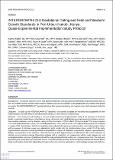| dc.contributor.author | Millar, Kathryn | |
| dc.contributor.author | Patel, Suha | |
| dc.contributor.author | Munson, Meghan | |
| dc.contributor.author | Vesel, Linda | |
| dc.contributor.author | Subbiah, Shalini | |
| dc.contributor.author | Jones, Rachel M. | |
| dc.contributor.author | Little, Sarah | |
| dc.contributor.author | Papageorghiou, Aris T. | |
| dc.contributor.author | Villar, Jose | |
| dc.contributor.author | Wegner, Mary Nell | |
| dc.contributor.author | Pearson, Nick | |
| dc.contributor.author | Muigai, Faith | |
| dc.contributor.author | Ongeti, Catherine | |
| dc.contributor.author | Langer, Ana | |
| dc.date.accessioned | 2022-08-24T21:50:58Z | |
| dc.date.available | 2022-08-24T21:50:58Z | |
| dc.date.issued | 2018-06-22 | |
| dc.identifier.citation | Millar, K., Patel, S., Munson, M., Vesel, L., Subbiah, S., Jones, R.M., Little, S., Papageorghiou, A.T., Villar, J., Wegner, M.N., Pearson, N., Muigai, F., Ongeti, C., & Langer, A.I. (2018). INTERGROWTH-21st Gestational Dating and Fetal and Newborn Growth Standards in Peri-Urban Nairobi, Kenya: Quasi-Experimental Implementation Study Protocol. JMIR Research Protocols, 7. | en_US |
| dc.identifier.other | PMID: 29934289 | |
| dc.identifier.other | PMCID: PMC6035346 | |
| dc.identifier.other | DOI: 10.2196/10293 | |
| dc.identifier.other | Corpus ID: 49385762 | |
| dc.identifier.uri | https://repository.amref.ac.ke/handle/123456789/788 | |
| dc.description.abstract | Background: The burden of preterm birth, fetal growth impairment, and associated neonatal deaths disproportionately falls on
low- and middle-income countries where modern obstetric tools are not available to date pregnancies and monitor fetal growth
accurately. The INTERGROWTH-21st gestational dating, fetal growth monitoring, and newborn size at birth standards make this
possible.
Objective: To scale up the INTERGROWTH-21st standards, it is essential to assess the feasibility and acceptability of their
implementation and their effect on clinical decision-making in a low-resource clinical setting.
Methods: This study protocol describes a pre-post, quasi-experimental implementation study of the standards at Jacaranda
Health, a maternity hospital in peri-urban Nairobi, Kenya. All women with viable fetuses receiving antenatal and delivery services,
their resulting newborns, and the clinicians caring for them from March 2016 to March 2018 are included. The study comprises
a 12-month preimplementation phase, a 12-month implementation phase, and a 5-month post-implementation phase to be completed
in August 2018. Quantitative clinical and qualitative data collected during the preimplementation and implementation phases
will be assessed. A clinician survey was administered eight months into the implementation phase, month 20 of the study.
Implementation outcomes include quantitative and qualitative analyses of feasibility, acceptability, adoption, appropriateness,
fidelity, and penetration of the standards. Clinical outcomes include appropriateness of referral and effect of the standards on
clinical care and decision-making. Descriptive analyses will be conducted, and comparisons will be made between pre- and
postimplementation outcomes. Qualitative data will be analyzed using thematic coding and compared across time. The study was
approved by the Amref Ethics and Scientific Review Committee (Kenya) and the Harvard University Institutional Review Board.
Study results will be shared with stakeholders through conferences, seminars, publications, and knowledge management platforms. | en_US |
| dc.description.sponsorship | Bill & Melinda Gates Foundation through grant number OPP1142163. | en_US |
| dc.language.iso | en | en_US |
| dc.publisher | JMIR Research Protocols | en_US |
| dc.subject | Ultrasound | en_US |
| dc.subject | Gestational age | en_US |
| dc.subject | Fetal growth | en_US |
| dc.subject | Health care quality | en_US |
| dc.subject | Anthropometry | en_US |
| dc.title | INTERGROWTH-21st Gestational Dating and Fetal and Newborn Growth Standards in Peri-Urban Nairobi, Kenya: Quasi-Experimental Implementation Study Protocol | en_US |
| dc.type | Article, Journal | en_US |

